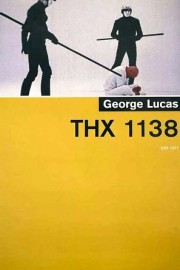THX-1138
It’s really easy to shit on George Lucas nowadays. See the “Star Wars” prequel trilogy, and his tinkering with the original trilogy. But back in the ’70s, he was one of the boldest and most exciting filmmakers around.
All you have to do is look at his first feature, based on his acclaimed student film. It’s not an easy film to get into the first time you see it (especially if all you’ve seen are the “Star Wars” films), but the more you watch, the most provocative and ambitious you find it…and Lucas.
The sound sets the tone for the film as a whole. If you ever doubt the importance of music and sound design to a film, the work of composer Lalo Schifrin and editor/sound designer Walter Murch (who also wrote the screenplay with Lucas) should put those doubts to rest. The film’s dystopian future- with tightly regulated medication and human contact, and Orwellian security watching everything- is enhanced by the work of these two masters as we see the opening of THX-1138’s (Robert Duvall) eyes to the cracks in the sterile world he lives in.
If the film’s sound conveys this world’s depth, the film’s look conveys pure simplicity. But how much Lucas accomplishes with so little visually is one of his film’s greatest strengths. We get the sense of the film’s dark, fascist underbelly through the white rooms (which seem to go on for longer than they appear), the confessional booths where an automated message acts as a priest and adviser to the mindless inhabitants. And robot guards are peacekeepers, but capable of brutality. Sex is tightly regulated (and manual stimulation isn’t exactly manual)- when THX and his partner are caught in the act, they are separated, with their erratic behavior used as evidence of a chemical imbalance from “drug violations.”
This is science fiction at its best- less fantasy adventure and more cultural and social allegory. Of course Lucas includes elements of action and suspense, but the film is primarily the work of a filmmaker whose interests go beyond the serialized adventures of Buck Rogers (which opens the film, and paved the way for “Star Wars”) and into a brilliant and exciting (intellectually and emotionally) work worthy of comparison to Philip K. Dick and Isaac Asimov.
When he finished the big-screen adventures of “Star Wars,” he said he was going to focus on returning to films like “THX-1138.” That hasn’t happened yet. But hopefully he won’t wait too long. Watching this film again, I was excited by the possibilities Lucas was capable of with the advancements he’s helped drive forward in cinematic technology.










